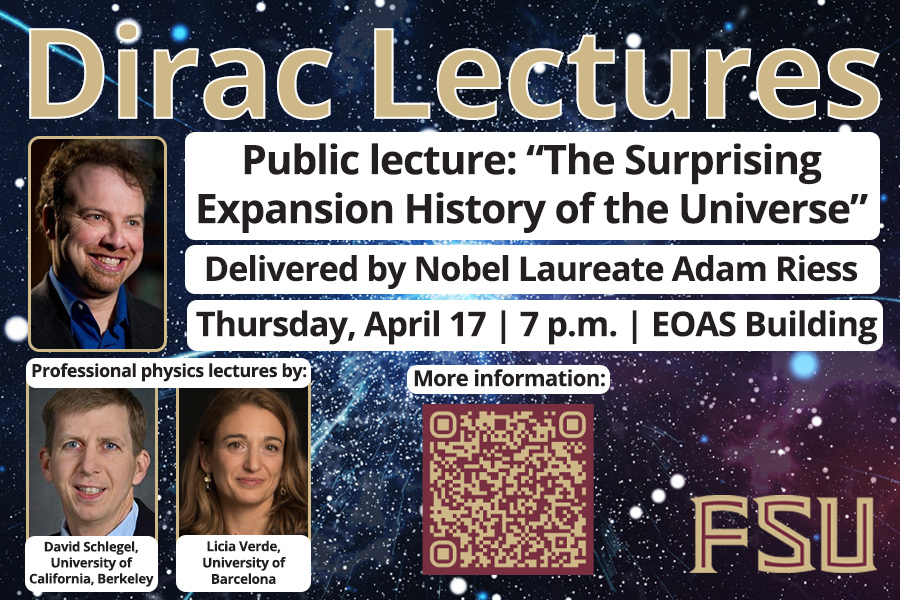
Nobel Prize-winning astrophysicist Adam Riess will share the latest research into the expanding universe in his public lecture, “The Surprising Expansion History of the Universe,” part of this year’s Dirac Lectures presented by the Florida State University Department of Physics.
Riess, the Bloomberg Distinguished Professor and Thomas J. Barber Professor of Physics and Astronomy at Johns Hopkins University, will explain how his team discovered the acceleration of the universe and why understanding the nature of so-called “dark energy” presents one of the greatest remaining challenges in astrophysics.
The Dirac Lectures celebrate the memory of Paul Dirac, a late FSU Physics faculty member, Nobel Laureate, and the namesake of the Dirac Science Library. These lectures bring outstanding speakers to FSU to present notable physics topics, both for a professional physics audience and for the general public.
Riess’ public lecture will take place:
THURSDAY, APRIL 17
7 P.M.
AUDITORIUM OF THE FSU EARTH, OCEAN AND ATMOSPHERIC SCIENCE BUILDING
1011 ACADEMIC WAY
TALLAHASSEE, FLA.
“We are honored to welcome Professor Riess to Florida State for this exciting talk,” said Jorge Piekarewicz, a professor in the Department of Physics and Dirac Lectures organizer. “His discovery that the universe is expanding at an ever-increasing rate is a profound contribution to our understanding of astrophysics.”
Riess’ research involves measurements of the cosmological framework with supernovae (exploding stars) and Cepheids (pulsating stars). Currently, he leads the SH0ES (Supernova, H0, for the Equation of State of Dark Energy) research team in efforts to improve the measurement of the Hubble Constant, and the Higher-z Team, which seeks to find and measure the most distant type Ia supernovae in order to probe the origin of cosmic acceleration.
Along with Riess, the FSU Department of Physics will host guest lecturers David Schlegel, senior scientist at the Lawrence Berkeley National Laboratory, and Licia Verde, professor at the University of Barcelona. Verde will present her lecture, “ΛCDM Status,” and Schlegel will present “3-D Cosmic Maps from DESI and Future Redshift Surveys.” Their latest results were recently featured in The New York Times. Riess will also present two lectures for professional physics audiences, “Dark Energy,” and “Hubble Constant Tension.”
The FSU Department of Physics first organized the Dirac Lectures in 2007. Guest lecturers have presented talks on neutrinos in nuclear physics, gravitational waves, quantum information science and other topics.
For more information and lecture details, visit the Dirac Lecture webpage.



